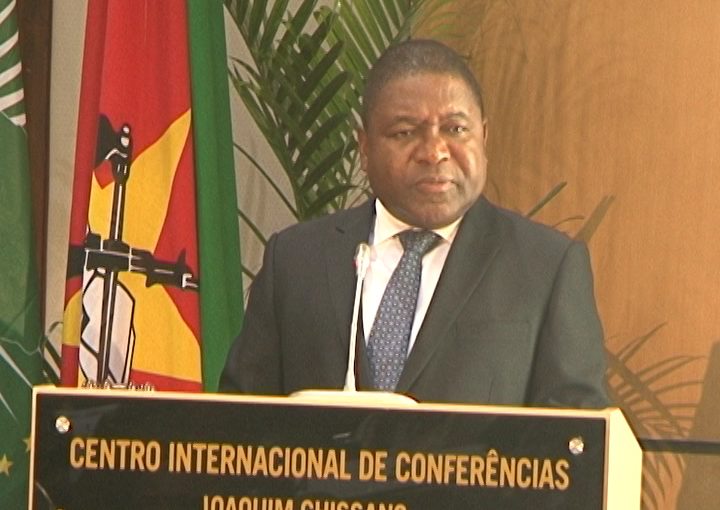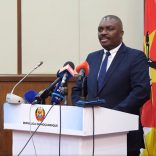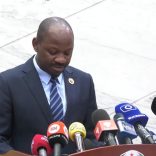Mozambique: Mondlane supporter victim of murder attempt - AIM report
Nyusi opens TICAD ministerial meeting – Watch

TVM / “In the framework of TICAD, we see the private sector playing a preponderant role in implementing investment projects which guarantee technological development, including the transfer of know-how”
Mozambican President Filipe Nyusi on Thursday night urged African leaders to adopt more appropriate measures in exploiting the continent’s vast natural resources so that they can effectively promote the socio-economic development and welfare of their peoples.
“Africa cannot continue to mortgage its growth and economic development”, warned Nyusi referring to the fact that Africa still largely depends on the export of unprocessed primary products as its main source of revenue, which subjects the continent to the multiple risks arising from the volatility of the world economy.
Nyusi was speaking in Maputo at the opening of a Ministerial Meeting of the Tokyo International Conference on African Development (TICAD), the forum for cooperation between Japan and Africa.
He argued that the most effective way of taking advantage of natural resources is by promoting more effective production, and by adding value in the productive structure, as well as by diversifying the economy.
“In the framework of TICAD, we see the private sector playing a preponderant role in implementing investment projects which guarantee technological development, including the transfer of know-how”, said Nyusi. “In Mozambique we assess positively our participation in TICAD, through which we have been implementing projects that have a significant impact on government programmes”.
Also Read: President says that African development cannot be forever based on extractive industries
He cited Japanese involvement in the Nacala Development Corridor, which includes the Nacala port, rail and road system benefitting not only Mozambique, but also Malawi, Zambia and the Democratic Republic of Congo.
In the field of energy, Nyusi stressed the construction in Maputo of a combined cycle gas fired power station, which will generate 110 megawatts for domestic and regional consumption. It is funded largely by a soft loan of 167 million US dollars from the Japanese International Cooperation Agency (JICA).
The President listed some of the challenges the continent faces in the context of a reborn Africa, such as the eradication of wars, the maintenance of peace, through dialogue, the consolidation of democracy and the role of law.
“As Africans we are deeply committed to the project of ensuring that the guns fall silent by 2020”, he said. “We are also committed to good governance, in order to build the welfare of our people and develop business with other peoples, and particularly with Japan”.
As targets to achieve, he pointed to the need to empower communities, and create a more communicative space heading towards “inclusive development”. Nyusi said this “is the best way of guaranteeing a system less prone to conflicts, and with greater social stability and human security”.
He praised stronger participation by the private sector, as a strategic partner of governments in driving growth and development.
For his part, the Japanese Foreign Minister, Taro Kono, said Japan will continue to make efforts to ensure free trade and to strengthen the linkages between Asia and Africa, including investment in African infrastructures.
The ministerial meeting, he believed, would consolidate the progress achieved at TICAD VI, held in Nairobi in 2016, where “our discussions on social stability were directed towards promoting resilience in the health systems”.
Kono cited what he claimed was an African proverb: “intelligence is like a baobab tree – nobody can embrace it on his own”. It was TICAD’s belief, he said, that by pooling together the intelligence of several partners it is possible to attain what one country alone cannot achieve.
The Special Adviser of the United Nations Secretary-General for Africa, David Hamam, said that the ministerial meeting is an ideal opportunity to discuss a wide range of aspects concerning Africa’s socio-economic growth, good governance, and peace and security, which are fundamental for the promotion of human development.
He added that full implementation of the recommendations from TICAD VI will contribute to attaining the Sustainable Development Goals of the UN’s Agenda 2030, and the African Union’s own Agenda 2063, the 50 year roadmap for the transformation of the continent.
Through TICAD, said Hamam, the countries should work to build the desired partnership in order to secure a future for Africa where none of its countries or citizens are left behind.
The TICAD ministerial meeting has brought more than 60 people to Maputo, including more than 30 African ministers.













Leave a Reply
Be the First to Comment!
You must be logged in to post a comment.
You must be logged in to post a comment.